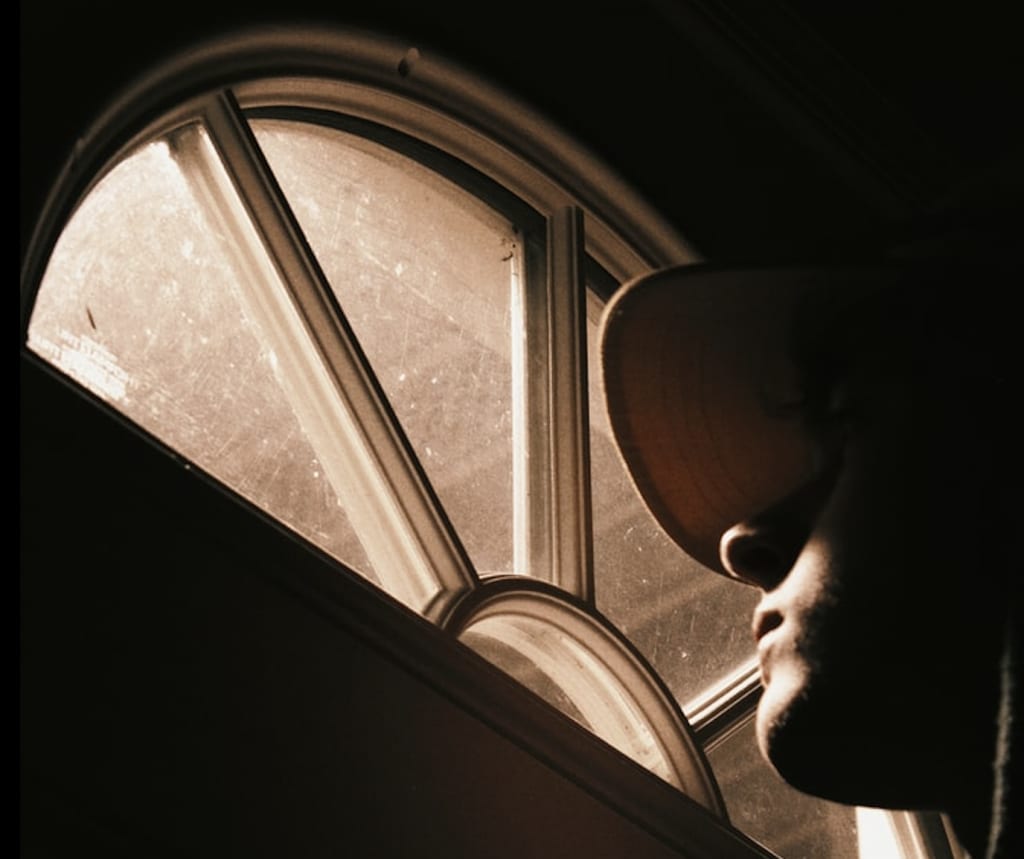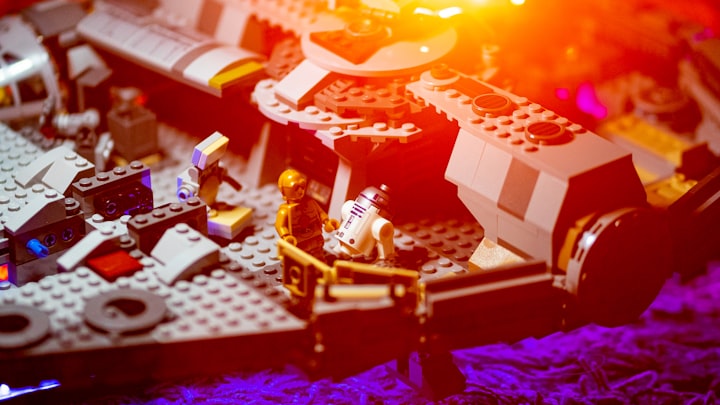Michael's Journal
Dehydrated and isolated: will he try to save his humanity or be consumed by it?

[-indiscernible-]
[-clears throat-]
Nobody can hear a scream in the vacuum of space, or so they say. When the television blared the story of the space station, I could hear screams.
I remember it clearly. I was making a batch of Kraft Dinner, a recurring meal, and it felt surreal. A blip in time where everything went quiet, even the crinkling lick of the gas flame beneath the iron pasta pot stilled.
The news anchor, monotone in his delivery, droned that the space station was destroyed from the inside out, killing all seven international crew members.
At the time, it wasn’t known if the crew members had improperly managed faulty equipment processes, or something else. I pictured them terrified, stripping down to their humanity with the fear of never seeing their families again on earth, swallowed by the surrounding void: though, I didn’t know if that was the reality. Vigils were held across the world.
And that was the start of it all.
My name is Michael Morgan. I live in a small apartment on 234 Broadway Ave., at the edge of the city of Phoenix, Arizona. I am twenty-six years-old, 5 foot 11 inches, and 172 pounds. I am a third year bachelor of science student at the University of Phoenix, majoring in psychology. It is Thursday, August 16 of the year 2028.
I started this entry to convey a series of events that took place across the world paired with a memoir of sorts, or a cathartic monologue. I do think it is now a necessary evil to pull out my notions and conjectures to help weigh the scale of my existence; my findings might place this as the final entry.
If that doesn’t sound promising, it isn’t. If that sounds a little crazy, blame it on my university major: 'talking to yourself is healthy,' after all. Especially so, since this entry is not written by hand, but transcribed from my laptop mic by an underdeveloped AI system. I need to feel like I’m having a conversation to keep from pacing.
So, here we go.
Week One:
When I was nineteen years-old, pieces of the Arctic Circle in Siberia approached more than 100 degrees Fahrenheit, revealing hellish, giant craters in thawing permafrost. The forests of the West Coast of the United States burned as never before, turning middays into dire, polluted sunsets that rained ash.
Of course, our future was already tainted with the illustrious scanning of global warming research: a caveat made by Oppenheimer some forty years ago, the seedling to the oak that became the documentary ‘The Inconvenient Truth’ of 2006. But I think we, most of the human race, believed global warming would end us by devastating means, and we saw no cataclysms.
Instead, it crept quietly. Water became its own currency in the year 2025. Every known waterway was infused with chemicals and micro-plastics, while access to fresh water disappeared for the common man. Water-bound fauna transpired with plastic-clogged digestive tracts so often, you could see and smell their fly-laden bellies lining rivers and lakes at any given time.
We were surrounded by water with none of it to drink.
Society accommodated by entering mitosis: syphoning into the elite and the unfortunate, where I find myself in the higher end of the latter.
And, very much a harbinger, a new, fresh water spring arose in the arctic, invited by the increased planetary temperatures and ice-melting. Countries, companies flocked to extract the water to bottle and sell to the elite, while the rest of society clamoured for the affordable filtration of chemical laden reservoirs. We drank the filtered, cloudy liquid from our taps long before the warnings were released.
Follow up stories circulated, covering the destruction of the space station. Initially, there were whisperings on social media, conspiracies abound, but soon, journalists released their leg work.
They leaked video footage to the public, captured by the commanding units at NASA that showed erratic behaviour in the crew members—NASA could only watch in horror, powerless due to the 24 minute space-to-earth transmission delay. The footage, grainy but true, depicted a unified coup as the crew destroyed the station by systematically dismantling its inner-workings, one by one. Eventually, they removed connection to their earth-bound superiors, cut video surveillance, and forced detonation.
How the crew performed the scale of destruction so efficiently, no one could explain, nor why, but the out-of-the-ordinary activity was their access to a new water shipment. Samples taken and investigated were later cited as containing a neurologically, psychologically targeted contaminant; originally believed to cause a reaction akin to nitrogen narcosis, the intoxicated behaviour and hallucinations found in deep-sea divers.
Unsurprisingly, the contaminant was identified in water from the arctic spring, shipped to the station in supplies as a treat from earth. And politicians rushed like panicked chickens to the masses, warning the world to avoid drinking the arctic spring water—the same water none of the general public could afford. They promised the source would be isolated and seemed to recline in the promise that they would 'save' us.
Some of us knew better. The line ups in grocery stores for uncontaminated, cloudy water and canned food that followed were understandably long. I know, because I needed a months worth of supplies, out of fear, I’ll admit.
And unfortunately and quite predictably, nature left systems of controlling the contaminant in the dust.
Week Two:
As if read aloud from a Stephen King novel, the contaminant was revealed as sentient by another leak in news outlets, astonishing the world. You couldn’t open an app without being force-fed summations, yet some news outlets seemed radio-silent in disbelief, as if reality were a child sitting amongst pieces of a beloved, destroyed heirloom.
Soon, researchers in diverse countries publicly revealed their studies.
Swedish researchers saw what they described as a “snowflake-like, defensive formation” created by the capsid of the contaminant when interacting with other pathogens. Japanese researchers were unable to destroy the capsids with multiple tools, as if the contaminants lipid bilayer, or the “envelope” exterior, were “made of diamond.”
Egyptian scientists found the most eerie conclusion by providing rats with samples of the water. They tracked the contaminants movements once absorbed into the blood stream and found that it immediately went into brain hemispheres, leaching into the fatty tissues to begin multiplying. But it became irritated and rejected the rat hosts and voluntarily expelled its numbers through urine excretions. The Egyptians found that the contaminant could lay dormant until it connected with rainfall or collected in puddles for redistribution once excreted.
In short, the contaminant preferred human tissue.
Political bodies around the world created a collective task force comprised of top neurologists, epidemiologists, scientists, immunologists and more, to conduct immunization research and incept a global plan to prevent further human contamination. They cited the contaminant as the “most pressing issue in recent history,” and seemed keen on maintaining public composure. They reassured, again, that the contaminant was contained.
Scholars, keynote speakers, television and radio hosts from across the world flocked to debunk, discuss, and ‘I-told-you-so’ the situation. They fired shots at global warming, the possible threat of more melting-ice pathogens being revealed and governmental, elite greed.
Still, the public at large knew only that the expensive spring water was dangerous and caused the destruction of the space station. None of us common folk knew how it could reach us.
Week Three:
By the time we did know, it was too late.
As if human error couldn’t be more vexatious, the contaminant found its way into those that studied it. With its seemingly indestructible and evolutionary constitution, it passed into the bodies of its researchers by means of moisture transference, who, unaware of their predicament, continued interacting as normal.
Seeping into the brain like water to a sponge, the contaminant performed what most of us can compare to data collection from its host, then, not unlike the root systems of trees, coordinated with other infected hosts. The hosts could work in unison, resembling the crew members of the space station. But unlike with the space station crew, the contaminant was engrossed and confident it needn't demonstrate more destructive power.
From there, it remained undetected by allowing its hosts control—the researchers were given access to meeting rooms full of political figures and higher armed security. It became wild fire during a dry spell.
Saliva, tears, moisture; every possible fluid transfer was cause for infection. The contaminant calmly, quickly, infiltrated the three most powerful hierarchies in human society: the rich, the armed forces and the genius.
At first, it was subtle to the public. Certain factories shut down and gifted its employees large bonuses to survive with for years, and currency inflation halted. Then political announcements of alliances and extended olive branches were shown amongst companies and countries never before seen palatable. The contaminant that had been reported on for weeks vanished from the news, replaced by content with positive and encouraging words toward tap water consumption.
Those of us that caught on recognized the smoke and mirrors. There were whispers of public revolt, but I imagine that most of humanity followed suit, tired of the dubiety. All they had to do was drink their tap water, as if they could do anything else.
Humans were miles behind before the race even started.
Week Four:
In just a handful of days, the contaminant took hold of the human population.
Its triumph resulted in unorthodox union; the contaminated began cleaning the seas of plastic debris and oil. They stopped oil production and logging extraction. They halted plastic production. They discontinued the use of currency in exchange for goods. They halted unnecessary animal slaughter and large scale fisheries.
In the streets, they are dismantling and removing concrete. They are planting community gardens. They are sharing food with animals and replanting trees. Funnily enough, they use and maintain internet connectivity, otherwise, I would know none of this. I can watch the world through the screens of my cellphone and laptop, surrounded by the shadows of my apartment.
Anyone with their mind intact stopped posting online to remain hidden weeks ago. The contaminated seem ignorant towards monitoring online activity, or deem it unnecessary, but the lack thereof gives us, me, a semblance of safety. They are keen on using their hosts social media, however, but their online interactions are discernible; promoting ecological restoration heavily. Thus, I am permanently on edge, waiting for my loved ones to post online about saving the planet, revealing contamination. So far, and luckily, none have.
To add to the angst, I don't actually have an idea on how many uncontaminated live in hiding like myself. I haven’t left the apartment since I returned with provisions in the first week. I've lost weight, six pounds to be exact. Perhaps I'm too afraid to visit the outside world again; the fear, the confusion, the smell of public anxiety was enough to approve my reclusion.
The videos of environmentalist activity online do make me wonder if I’m cut out for the world they're bringing back, albeit righteous. Maybe I am fat to be trimmed.
I am a loner after all, the kid that always seemed to be asleep in class yet never failed, with one, maybe two friends at any given time—but this loneliness is advanced.
The only thing that’s granted me passage to be semi-functional is viewing the remnants of my family and friends online. I’m not estranged, but I did make the move for university to enjoy being an adult; anticipating this much separation was beyond me. School was supposed to begin in a few weeks.
I don’t own a cat or a dog to share affection with, a simulacrum of solace even, and as a psychology major, I know where I’m headed mentally. I’m getting tired.
Present-day:
Every sci-fi buff I know wanted to see a future like Philip J. Fry’s in Futurama: flying cars, interspecies cohabitation, human cryogenic freezing, and I don’t know, maybe intergalactic, light-speed travel. But what we were living in was so far off-track from the reality we imagined as ‘progress.'
We deteriorated the planet not just for ourselves but thousands of species, with no back up plan in sight, and a shrinking future burning at both ends. We proxied monsters, supernatural forces, things that go ‘bump in the night’ and scaled them so far from ourselves, that we didn’t even recognize when we had become the proxy.
With that in mind, I can’t say that we were realistically self-aware, which is obvious in how easily overtaken by a single, sentient pathogen we were. We were vulnerable, and futilely behaving as if we weren’t.
If given the chance to restart anew, I don’t know if we would. In fact, as I say this, I can’t decide if I want to save myself. I mean, I’m hushed, whispering to a computer in my bedroom with every tattered blind shut, save for a semi-circular window in the front door, while the contaminated are replenishing the planet. I'm terrified.
And am I significant? Remembering the Kitty Genovese case from the 1960’s, studied in branches of sociology, our species can sit on the sidelines through the bystander effect, as atrocities are committed right in front of us. Am I any different? Absolutely not. I can think of a hundred situations I remained stagnant in when I shouldn’t have; this is another.
And now we face what I can only call extinction. But not the kind of erasure that would make us shudder: plague, nuclear war, widespread famine, no. We face intellectual deletion, the complete relinquishment of freedom and negation of our will to an unseen entity. An entity so perfect for our demise to have infiltrated water, no less. An entity that offers painless infection and seamless integration, convergence to a collective consciousness; which doesn’t seem so disturbing if you’ve seen the Alien movies, with extra-terrestrial offspring popping out of their human incubators. Our demise could be worse.
And looking back through history, how many nations were violently colonized in the name of progress, and how often was that progress progressive? I suppose this is all but poetic justice for past ills—majority of our species is now assimilated to a degree we could never attain internally, and the outcome seems progressive.
So, can humanity not be misconstrued as the virus and the contaminant the cure by any third party observer? What if this is the retribution for our own aversion to our environment, whose ecosystems we extricated ourselves from and placed beneath us? Is this the price to be paid, or the true development of human progress? Can we not say it was 'only a matter of time?'
Existentially, I wonder if my perspectives make me nihilistic, or a human traitor, but I can't be sure. My head is pounding.
I've laid out more than one dissertation, I know, but these questions, of course, may go unanswered. I just can’t stop thinking. Thinking is all that remains here and maybe I’m trying to accept the inevitable.
The reality is that I don’t have any food or uncontaminated water left—if I don’t leave the apartment, I only have access to the kitchen and washroom taps.
And I’m dehydrated.
[-incoming call-]
[-indiscernible-]
About the Creator
Chezney Martin
A developing creative writer with a background in journalism, probably day dreaming about the latest Top Stories. Officially in the routine of writing every. single. day. ✍️
Reader insights
Outstanding
Excellent work. Looking forward to reading more!
Top insights
Compelling and original writing
Creative use of language & vocab
Easy to read and follow
Well-structured & engaging content
Excellent storytelling
Original narrative & well developed characters
Masterful proofreading
Zero grammar & spelling mistakes
On-point and relevant
Writing reflected the title & theme
Heartfelt and relatable
The story invoked strong personal emotions
Expert insights and opinions
Arguments were carefully researched and presented
Eye opening
Niche topic & fresh perspectives






Comments (7)
I'm going out to buy water by the gallon after this. I couldn’t put this down. I feel sci-fi can't exist without the science, so I thought this was masterfully done. GREAT job!
This was incredible! I loved the boookending of it being a recording, I loved the way you unfolded what was happening, I loved the message. Stellar work!
The first person worldly conscious point of view is what makes this such an enjoyable read. This story is self aware of its impending fate and understands that this fate may very well be poetic Justice for how the world has destroyed its own innocence and for those reasons is this story a uniquely complex take on the challenge. Great job Chezney
I love how you've managed to imply so many things about humanity through your imagery, without directly stating several ideas. Kudos.
Wow! I love the science and geography you've woven together. Very compelling narrative. "Am I significant" is such a universal feeling and you timed its insertion perfectly. Really well done!
Awesome!! Outstanding sci-fi story!!! Hearted & subscribed.👏💖💕
Wow! This is spectacular writing. Your use of science and humanities shit storm of stupidity is outstanding. Loved it.